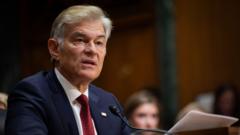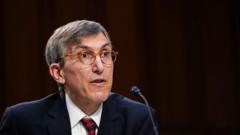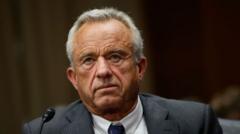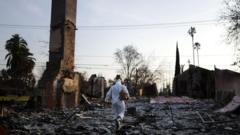The US Department of Health and Human Services has announced the cancellation of $500 million in funding for mRNA vaccine projects, which has led to significant criticism and concern about public health implications.
US Cancels $500M mRNA Vaccine Funds Amid Controversy

US Cancels $500M mRNA Vaccine Funds Amid Controversy
Health Secretary Robert F. Kennedy Jr. withdraws funding, citing safety concerns over mRNA technology.
In a surprising move, the US Department of Health and Human Services (HHS) has decided to cancel $500 million in funding aimed at developing mRNA vaccines targeting respiratory viruses, including COVID-19 and influenza. This decision affects 22 ongoing projects led by major pharmaceutical firms such as Pfizer and Moderna. Health Secretary Robert F. Kennedy Jr., known for his skeptical views on vaccines, justified the cancellation by arguing that "mRNA technology poses more risks than benefits for these viral infections."
Kennedy's assertion has drawn condemnation from the medical community, with many experts highlighting the critical role mRNA vaccines played in managing the COVID-19 pandemic and saving countless lives. Peter Lurie, former official at the US Food and Drug Administration, remarked that this decision represents the US "turning its back on one of the most promising tools to fight the next pandemic."
In his statement, Kennedy claimed that extensive review of scientific data led to the conclusion that mRNA vaccines do not effectively protect against upper respiratory infections. He mentioned a shift in funding focus towards "safer, broader vaccine platforms" that would remain effective in the face of viral mutations. His claim that mRNA vaccines may encourage virus mutations and prolong pandemics has been met with skepticism by health professionals, including Dr. Paul Offit, director of the Vaccine Education Center at Children's Hospital of Philadelphia. Offit emphasized that viruses mutate regardless of vaccination status and reiterated the safety of mRNA vaccines in preventing severe infections.
Moreover, HHS indicated that the Biomedical Advanced Research and Development Authority (BARDA), which oversees vaccine projects, is pivoting to platforms that offer better safety records. Notably, mRNA vaccines operate by instructing cells to produce proteins that elicit immune responses, having undergone extensive testing for safety and efficacy prior to distribution.
Dr. Offit cautioned that this funding withdrawal could jeopardize the US's preparedness for future pandemics given that mRNA vaccines have shorter production timelines. Since assuming office, Kennedy has made numerous changes within the health department, including dismissing an entire committee responsible for national vaccination recommendations and altering the CDC's immunization schedules for children and pregnant women.
As this development unfolds, questions about the future of vaccine development and public health policy continue to linger, particularly regarding how the nation will approach immunization and pandemic readiness.




















